Lexus ES vs Peugeot 308 – Differences & prices compared
Compare performance, boot space, consumption and price in one view.
Find out now: which car is the better choice for you – Lexus ES or Peugeot 308?
The Lexus ES (Sedan) comes with a Full Hybrid engine and Automatic transmission. In comparison, the Peugeot 308 (Hatchback) features a Diesel, Plugin Hybrid, Electric or Petrol MHEV engine with Automatic transmission.
When it comes to boot capacity, the Lexus ES offers 454 L, while the Peugeot 308 provides 412 L – depending on how much space you need. If you’re looking for more power, decide whether the 218 HP of the Lexus ES or the 180 HP of the Peugeot 308 suits your needs better.
In terms of consumption, the values are 5.10 L per 100 km for the Lexus ES, and 15.60 kWh1.30 L for the Peugeot 308.
Price-wise, the Lexus ES starts at 46600 £, while the Peugeot 308 is available from 28600 £. Compare all the details and find out which model fits your lifestyle best!
Lexus ES
The Lexus ES represents a blend of luxury and comfort, offering a smooth driving experience that is characteristic of the brand. With its elegant design and meticulously crafted interior, it provides a serene environment for both driver and passengers. The inclusion of advanced safety features and cutting-edge technology enhances its appeal, ensuring that every journey is not only enjoyable but also secure.
details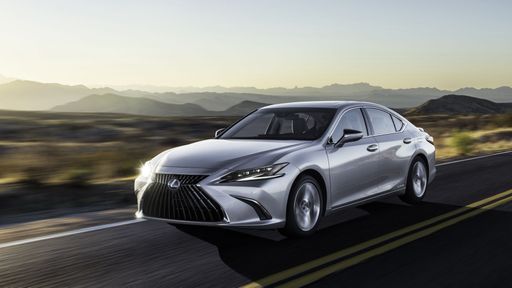 @ toyota-media.de
@ toyota-media.de
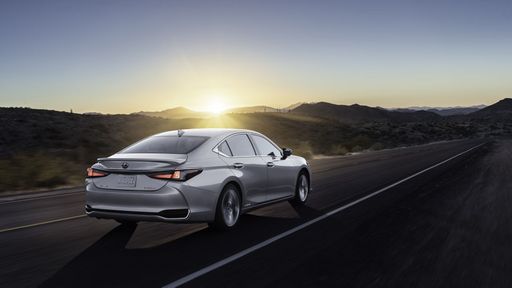 @ toyota-media.de
@ toyota-media.de
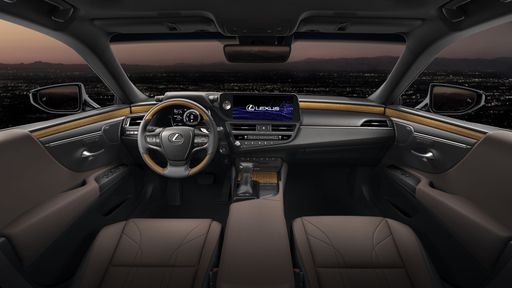 @ toyota-media.de
@ toyota-media.de
Peugeot 308
The Peugeot 308 presents a refined blend of style and sophistication, making it a compelling option for anyone in search of a dynamic yet practical vehicle. Its sleek design is complemented by a thoughtfully crafted interior that ensures both driver and passengers travel in comfort and elegance. Moreover, the 308 offers a responsive driving experience, combining agility with a sense of security on the road.
details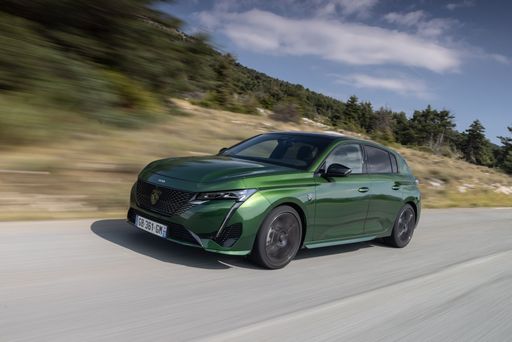 @ media.stellantis.com
@ media.stellantis.com
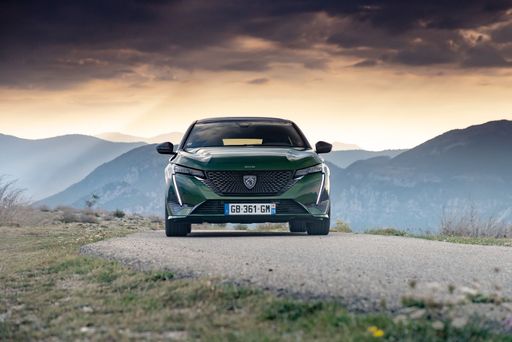 @ media.stellantis.com
@ media.stellantis.com
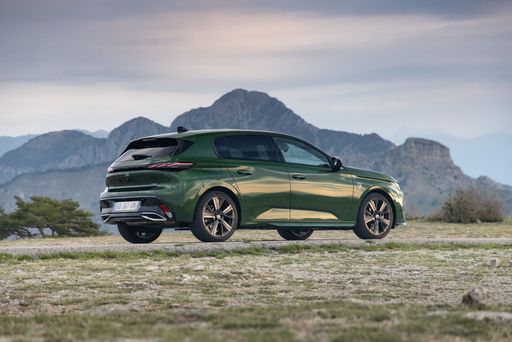 @ media.stellantis.com
@ media.stellantis.com
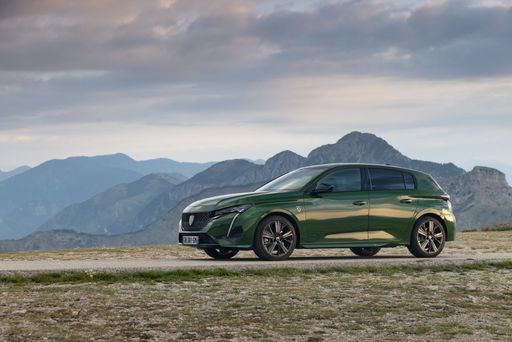 @ media.stellantis.com
@ media.stellantis.com
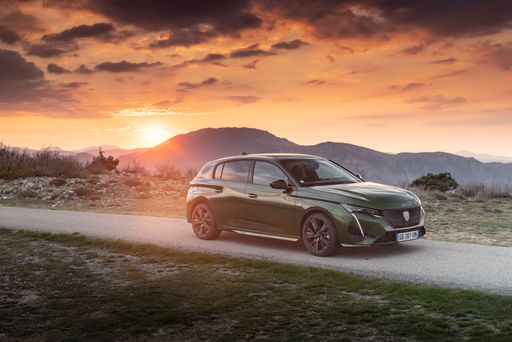 @ media.stellantis.com
@ media.stellantis.com
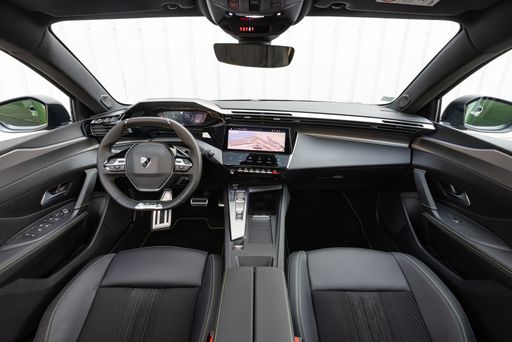 @ media.stellantis.com
@ media.stellantis.com

|

|
|
|
|
Costs and Consumption |
|
|---|---|
|
Price
46600 - 59300 £
|
Price
28600 - 41700 £
|
|
Consumption L/100km
5.10 L
|
Consumption L/100km
1.3 - 5.1 L
|
|
Consumption kWh/100km
-
|
Consumption kWh/100km
15.60 kWh
|
|
Electric Range
-
|
Electric Range
57 - 419 km
|
|
Battery Capacity
-
|
Battery Capacity
11.3 - 51 kWh
|
|
co2
115 g/km
|
co2
0 - 133 g/km
|
|
Fuel tank capacity
50 L
|
Fuel tank capacity
40 - 53 L
|
Dimensions and Body |
|
|---|---|
|
Body Type
Sedan
|
Body Type
Hatchback
|
|
Seats
5
|
Seats
5
|
|
Doors
4
|
Doors
5
|
|
Curb weight
1680 kg
|
Curb weight
1436 - 1759 kg
|
|
Trunk capacity
454 L
|
Trunk capacity
361 - 412 L
|
|
Length
4975 mm
|
Length
4367 mm
|
|
Width
1865 mm
|
Width
1852 mm
|
|
Height
1445 mm
|
Height
1441 mm
|
|
Payload
470 kg
|
Payload
431 - 510 kg
|
Engine and Performance |
|
|---|---|
|
Engine Type
Full Hybrid
|
Engine Type
Diesel, Plugin Hybrid, Electric, Petrol MHEV
|
|
Transmission
Automatic
|
Transmission
Automatic
|
|
Transmission Detail
-
|
Transmission Detail
Automatikgetriebe, Automat. Schaltgetriebe (Doppelkupplung)
|
|
Drive Type
Front-Wheel Drive
|
Drive Type
Front-Wheel Drive
|
|
Power HP
218 HP
|
Power HP
130 - 180 HP
|
|
Acceleration 0-100km/h
8.90 s
|
Acceleration 0-100km/h
7.6 - 10.6 s
|
|
Max Speed
180 km/h
|
Max Speed
170 - 225 km/h
|
|
Torque
-
|
Torque
230 - 360 Nm
|
|
Number of Cylinders
4
|
Number of Cylinders
3 - 4
|
|
Power kW
160 kW
|
Power kW
96 - 133 kW
|
|
Engine capacity
2487 cm3
|
Engine capacity
1199 - 1598 cm3
|
General |
|
|---|---|
|
Model Year
2024
|
Model Year
2023 - 2025
|
|
CO2 Efficiency Class
C
|
CO2 Efficiency Class
D, B, A, C
|
|
Brand
Lexus
|
Brand
Peugeot
|
Lexus ES
Explore the Alluring Elegance of the Lexus ES
The Lexus ES continues to uphold its reputation as a beacon of luxury and innovation in the automotive world. Known for its graceful design and premium feel, the ES series offers an impressive blend of performance and efficiency. With a focus on technical prowess and sustainability, this model is a testament to Lexus's commitment to excellence.
Performance and Efficiency: A Seamless Blend
At the heart of the Lexus ES is its full-hybrid technology. The 218 PS powertrain, featuring a 4-cylinder engine, harmoniously integrates a combustion engine with an electric motor to provide a remarkable drive. The ES achieves its impressive power output of 160 kW while maintaining a commendable fuel consumption of 5.1 L/100 km. This balance between power and efficiency is manifested in its acceleration from 0 to 100 km/h in just 8.9 seconds, powering seamlessly through a cost-effective CVT-gearbox with front-wheel drive. Despite its athletic capabilities, the ES remains well within the bounds of responsible emissions with a CO2 output rated at 115 g/km.
Design and Comfort: A Statement of Luxury
The Lexus ES's exterior is crafted as a testament to sophistication. Its sleek silhouette measures 4975 mm in length, 1865 mm in width, and 1445 mm in height, with a striking aesthetics that demands attention. The interior offers spacious comfort with seating for five, highlighted by high-quality materials and meticulous attention to detail. Additionally, the boot space offers a generous 454 litres capacity, ensuring practicality is not compromised.
Technological Advancements and Features
Equipped with the latest in automotive technology, the Lexus ES features a suite of advanced driver-assistance systems for enhanced safety and convenience. From its responsive infotainment system to the intuitive controls, each feature has been designed with the driver in mind. For those seeking variety, the car is available in several trim levels including the Automatik, Business Edition Automatik, Executive Automatik, and Luxury Automatik, offering a tailored experience for every discerning driver.
Cost of Ownership
With prices ranging from €54,350 to €69,200, the Lexus ES provides a competitive edge in the luxury segment with its multitude of features. The running costs are also reasonable, with expense estimates ranging from €1,289 to €1,497 per month and a cost per kilometre between 51.6 and 59.9 cents. This cost efficiency makes it a feasible choice for those looking to balance luxury with practicality.
Conclusion: A Hybrid of Innovation and Style
The Lexus ES stands as a prime example of how hybrid technology can transform the driving experience, merging the thrill of performance with the benefits of fuel efficiency. With its state-of-the-art features and impeccable build, the ES is a remarkable vehicle for those who seek luxury and innovation on the road.
Peugeot 308
Unveiling the Peugeot 308: A Blend of Style and Innovation
The Peugeot 308, an exemplar of French automotive engineering, brings together sleek design, advanced technology, and efficient performance. This hatchback caters to a diverse range of drivers, from eco-conscious individuals to those seeking a spirited driving experience. Let’s delve into the technical details and innovative features that define the Peugeot 308.
Powertrain Options: From Conventional to Cutting Edge
The Peugeot 308 offers an impressive array of powertrains to suit varying preferences and needs. Whether you opt for a traditional petrol, a fuel-efficient diesel, a sophisticated plug-in hybrid, or the fully electric variant, the 308 ensures an engaging drive. Petrol and diesel engines offer power outputs ranging from 130 to 130 PS, catering to both urban commutes and highway drives. The plug-in hybrid variants, boasting up to 225 PS, promise a seamless blend of power and efficiency, with an electric-only range of up to 57 km, perfect for city driving.
Engineering and Efficiency: Striking a Balance
The engineering marvel lies in the Peugeot 308's commitment to efficiency without compromising on performance. The fuel economy stands out, with consumption figures between 1.3 L/100km for plug-in hybrids and 5.9 L/100km for petrol engines. The electric version showcases an impressive 15.6 kWh/100km, allowing an electric range of 419 km, making it a viable option for those looking to reduce their carbon footprint.
Anatomy of Design: Sleek and Functional
Peugeot’s design philosophy shines through in the 308, with a captivating combination of elegance and practicality. Its dimensions - 4367mm in length, 1852mm in width, and 1441mm in height - create a spacious yet maneuverable vehicle. The five-door hatchback accommodates up to five passengers, offering a comfortable journey while boasting a boot space of 361 to 412 litres.
Technological Innovations and Features
The 308's cabin is a testament to Peugeot's commitment to innovation. It features an intuitive digital i-Cockpit, offering a more engaging driving interface with a configurable 10-inch digital cluster and a high-definition central touchscreen. Advanced driver assistance systems ensure safety and convenience, including adaptive cruise control, lane-keeping assist, and automated emergency braking, which elevate the driving experience.
Performance and Dynamics: Designed for the Enthusiast
Performance in the Peugeot 308 is not merely a promise but a reality, with acceleration from 0-100 km/h achieved in 7.5 to 10.6 seconds depending on the model. The dynamic chassis ensures a stable and responsive driving experience, while the range of gearbox options, including a smooth automatic and a manual transmission, cater to different driving styles.
Conclusion: The Allure of the Peugeot 308
The Peugeot 308 epitomises the blend of style, efficiency, and innovation. It offers a diverse range of powertrain options, ensuring that there’s a 308 for every kind of driver. Whether you're drawn to its design, captivated by its technology, or impressed by its efficiency, the 308 stands as a testament to Peugeot's evolution in the modern automotive landscape.
The prices and data displayed are estimates based on German list prices and may vary by country. This information is not legally binding.
